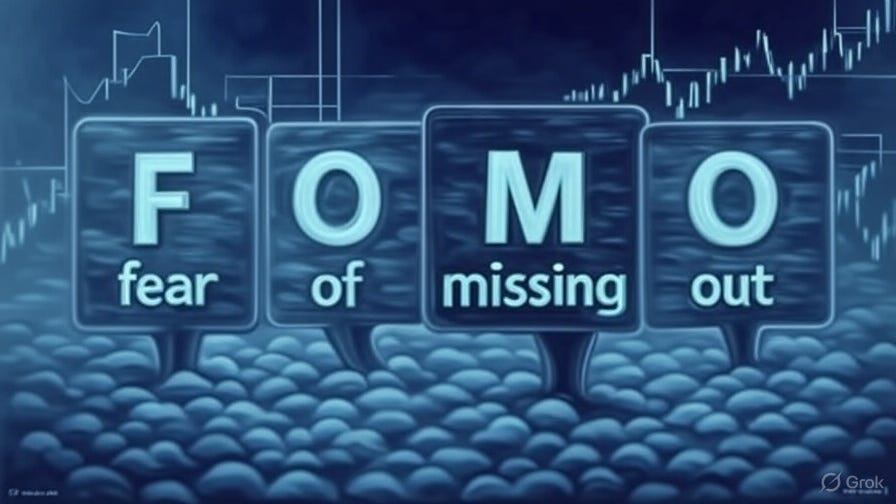Image by Grok
About the Author
Josh Obsisian (Fictitious) is a practising psychologist in the financial sector, specialising in behavioural finance, group dynamics, and the psychology of market influence. With a clinical background and over a decade of experience working at the intersection of human cognition and capital markets.
Often compared—perhaps a touch flatteringly—to Wendy Rhoads of Billions, I try to bring a keen eye to the subconscious drivers behind investor sentiment, herd mentality, and market manipulation. I have recently become interested in identifying toxic narratives and personalities in trading communities, helping institutions and individuals remain anchored in clarity amid the chaos.
Monday 7th July 2025
The Psychological Aspects of FOMO
Why Your Brain’s Not Always On Your Side When It Comes to Investing
Ever felt that twitch of panic when everyone else seems to be making money hand over fist, and you’re sat there wondering if you’ve missed the boat entirely? Maybe a mate’s boasting on WhatsApp about their crypto haul, or your cousin won’t shut up about his latest FTSE 100 triumph at the family BBQ. Before you know it, you’re contemplating flinging your savings into the first thing that moves—just to feel like you’re doing something. That, in short, is FOMO—the fear of missing out—and trust me, it’s far more psychological than financial.
I often wonder how I might have reacted during the dot com boom had I been old enough at the time?
So, why does it feel so visceral, especially for those new to investing? Let’s dissect the inner workings of your decision-making psyche.
Why Your Brain Isn’t Always Rational
FOMO is not merely a passing feeling. It’s an emotional reflex hardwired into our psychology—specifically designed to provoke action, often at the exact moment when pause and perspective would serve us better. It springs from three main psychological pressure points:
1. Social Comparison: Keeping Up with the Investment Joneses
Humans, by design, are comparison machines. Whether it's who’s got the nicer car, the better job, or the smarter portfolio—we’re constantly measuring ourselves against others. In investing, this manifests as the gnawing sense that everyone else is cashing in, while you’re dithering. Picture yourself in the pub. One mate’s just made a killing on a little-known UK tech stock, another’s crowing about their crypto gains. You smile politely, nod along—but inside, the panic is brewing. “Should I be doing the same?” you wonder. The impulse to act springs not from logic, but the fear of being left behind.
2. Loss Aversion: Missing Out Feels Like Losing Out
Here’s something counterintuitive—psychological research suggests that we feel the pain of a missed opportunity more intensely than the pain of actual loss. It’s not rational, but it’s very real.
Suppose you were eyeing a FTSE 100 share last month but didn’t bite. Now it’s up 20%, and you feel like you’ve somehow lost money. You haven’t, of course—but tell that to your amygdala, which is now sulking in a corner like a teenager denied their Wi-Fi.
3. The Bandwagon Effect: Everyone’s Doing It, So Should I
This one’s prehistoric. In early human tribes, if everyone suddenly ran in one direction, it was usually wise to follow—sabre-toothed tigers and all that. Fast-forward to now, and the same neural circuitry lights up when you see mass excitement over a trending investment.
There’s a buzz around a Manchester property boom, or everyone and their dog is investing in a hyped-up fintech firm. You’ve no idea if it’s sound—but it feels safer because others are doing it. That’s not insight; it’s instinct, masquerading as strategy.
Why New Investors Are Especially Susceptible
New investors haven’t yet built the mental calluses that come from market ups, downs, and the long, boring bits in between. Without that experience, it’s harder to separate noise from genuine signals. Add to that the illusion of expertise on social media and the ceaseless optimism of the financial press, and you’ve got the perfect storm.
It’s a bit like arriving at a party where everyone seems wildly confident and halfway through their third champagne. You’re just trying to work out where the coat rack is, and someone’s already offering you investment advice between sips of prosecco.
The Cheeky Truth
Here’s what they don’t tell you: most of the people bragging about their market wins have also got a few catastrophic losses they’re not posting about. FOMO convinces you that you’re the only one not in on it, when in fact, everyone’s bluffing to some degree.
FOMO isn’t the market whispering in your ear—it’s your brain, playing dress-up in a panic hat. Recognising this is your first line of defence.
Your Takeaway
So next time your cousin announces his crypto wallet has “mooned” or Twitter’s ablaze with the latest hot tip, take a breath. Remind yourself: reacting emotionally is human, but reacting intelligently is how you build wealth. Stick to your plan. Your rational brain—quiet, calm, and underused—will thank you.
Next: Part III - How FOMO Affects Investment Decisions
Caveat Trader:
This isn’t advice, guidance, or a tip-off. It’s merely a peek behind the financial curtain. If you’re about to remortgage your nan’s bungalow based on this infographic—don’t. Consult a proper financial professional instead.




